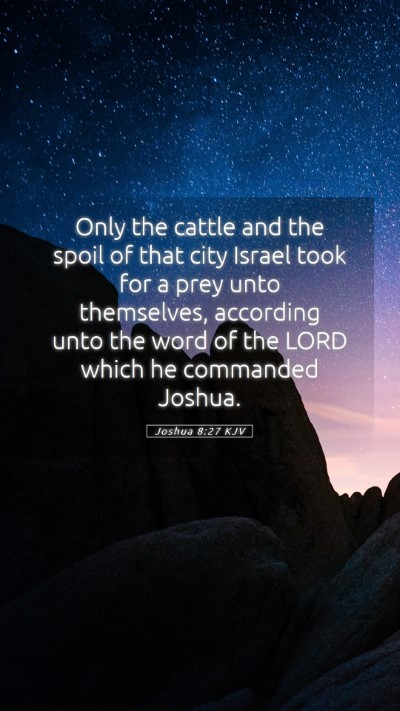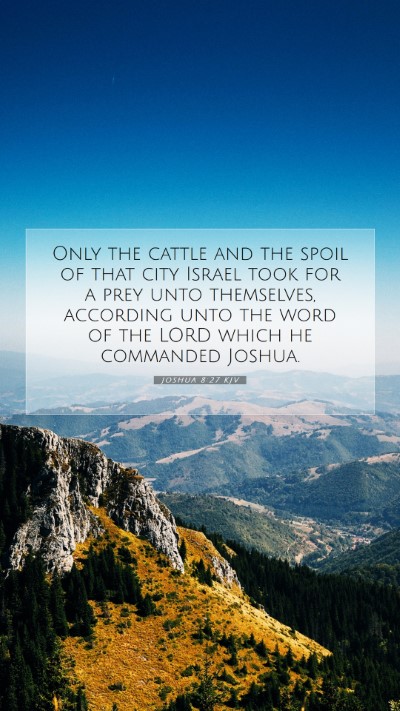Understanding Joshua 8:27
Bible Verse: Joshua 8:27 - "Only the cattle and the spoil of that city Israel took for a prey unto themselves, according unto the word of the Lord which he commanded Joshua."
This verse provides a significant insight into God's command and its execution during the conquest of Ai by the Israelites under Joshua's leadership. It emphasizes obedience, the divine order of warfare, and the distinction between divine judgment and the spoils that can be claimed by the victors. Below, we explore the verse's implications and interpretations based on noted public domain commentaries.
Commentary Insights
-
Matthew Henry's Commentary
Matthew Henry highlights the importance of the execution of God's orders. In this instance, the command was clear that the Israelites were allowed to take the cattle and spoils of Ai. This illustrates a principle of divine justice where the resources of the conquered are allocated to the victors as a reward for their faithfulness and as part of God's providential blessings.
-
Albert Barnes' Notes
Barnes notes that this instruction underscores the integration of God's will into the practical aspects of warfare. The fact that the Israelites could take the spoils was a demonstration of God's favor and a means to support the community of faith. This action linked directly to the blessings promised to Israel should they remain obedient to God’s commands.
-
Adam Clarke's Commentary
Clarke points out that the methodology used in the conquest of Ai was distinct, emphasizing the importance of divine strategy. The clause "according to the word of the Lord" reinforces that the outcome was preordained by God. The specifics regarding cattle and spoil represent the tangible rewards of their obedience and serve as a reminder of the reward system that God set in place for His people.
Significance of the Verse
This verse encapsulates several layers of meaning as part of the larger narrative of Israel's conquest in the Promised Land:
- Divine Instruction: It reflects the necessity of adhering to God's directives as integral to securing victory.
- Provision for God’s People: The spoils of war serve as provision for the people, emphasizing that God cares for their material needs.
- Separation of Holy War: The taking of spoils also illustrates the distinction between the people of God and those who oppose Him, asserting divine authority over all resources.
Application of the Verse
Incorporating the meaning of this verse into daily life entails recognizing divine guidance in our pursuits and understanding that obedience to God is often accompanied by blessings, both spiritual and material. Here are ways this can be applied in contemporary contexts:
- Dependence on God's Guidance: Before undertaking significant decisions or "battles," individuals should seek God's wisdom and direction in prayer.
- Recognizing Divine Provision: Acknowledging the resources available in one's life as part of God's blessing encourages gratitude and responsible stewardship.
- Understanding Spiritual Warfare: Engaging in spiritual activities that align with God's will can lead to fruitful outcomes, mirroring the conquest narratives in Joshua.
Related Bible Cross References
- Deuteronomy 20:14: On the treatment of captives and spoils in warfare.
- Joshua 1:7-8: The importance of meditating on and obeying God’s commands.
- Joshua 7:1: The consequences of disobedience and their impact on the community.
Summary
In summary, Joshua 8:27 elucidates the themes of divine instruction, community provision, and the rewards of obedience, set against the backdrop of the larger narrative of the Israelites’ conquest of the promised land. For anyone engaged in Bible study, this verse provides rich material for exploration of Bible verse meanings, Bible verse interpretations, and Bible verse explanations.


